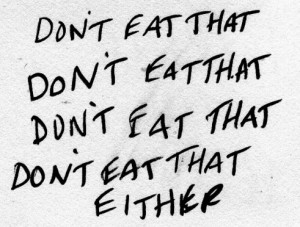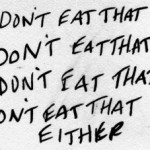There are hundreds of diets flooding the nutrition industry today with the sole purpose of helping people lose weight. The bad thing is, these diets come with a strict set of guidelines to follow. One diet will tell you not to eat “this” while another says don’t eat “that”.
Cravings persist when we’re in a situation where we can’t have a particular food. Eventually we cave in, leading to a host of negative thoughts, high emotions, and poor results.
This is a trend that needs to stop if we ever want to be successful with weight loss and long-term weight management. We need to realize that we’re humans that want to indulge from time to time. Taking this a step further, we need to understand that occasionally indulging will not hinder any progress when done properly.
So, how do we go about doing this? Well, I want to share three simple strategies you can use to eat the foods you love and still lose weight.
Before I do that, I want to mention the most important aspect to weight loss is to eat fewer calories than you expend on a daily basis (a.k.a. caloric deficit). This forces your body to use stored energy, which will ultimately lead to weight loss (1). You must be in a caloric deficit to be successful with the tips I’m about to share.
Now, onto the strategies!
1. Eat less in the morning/afternoon
Most people consume more food in the evening, which is when they’re most social and don’t want to be concerned about what they eat and drink. Since this is the case, if you want to eat a little extra with dinner, all you need to do is consume less during the morning and afternoon to free up some calories for the evening.
For example, let’s say you’re having dinner tonight with a friend you haven’t seen in months. In addition to your meal, you decide to have alcohol and dessert, which easily adds an extra 300-400 calories. To offset this, simply eat 150-200 calories less during breakfast and lunch. This strategy will keep you from worrying about what you’re eating and allow you to enjoy the meal with your friend.
2. Cycle your carbohydrates
Carbohydrates have been demonized for making people gain weight. The truth is, carbohydrates aren’t responsible. Instead, it’s the overconsumption of food that’s at fault. Research studies have shown if you overeat anything you will gain weight (2,3). Most people tend to overeat carbohydrates because they are delicious and quickly digested.
A simple way to decrease your daily caloric intake is to cycle your carbohydrates. This means eating more carbohydrates on some days (preferably days you exercise) while eating less carbs and more fat on other days (non-exercise days). Your protein stays relatively the same. One study examined this and found carb cycling led to greater weight loss, fat loss, and improved insulin sensitivity when compared to a calorie restricted Mediterranean diet (4).
To do this properly, shoot for 50 grams of carbohydrates 2 times per week and 125-200 grams (depending on your activity level) the other 5 days. By doing this, you’re able to indulge in some tasty high carb food without hindering your progress.
3. Prepare ahead of time
This strategy is for those who struggle controlling themselves when surrounded by food. I know many people experience this and it can be incredibly difficult to overcome. Preparation is key if you want to be successful. When you leave things to chance, nothing good happens.
To prepare, all you need to do is decide what you will eat before you eat. For example, let’s say you are going on a cruise for 3 nights and your weakness is dessert. There’s obviously no shortage of food on cruises, so you decide you will eat 1 small dessert every night. When you determine this beforehand, it leaves you in control of the outcome.
This simple tip can be used to keep you focused and on track especially when you are on vacation or weekend trips. You’re able to keep your calories in check while enjoying a few treats.
You will never be perfect while trying to lose weight. There will always be cravings and urges. Remember, it’s fine to indulge in moderation. The three strategies I have presented will help remove stress, keep you sane, and make it easy to eat your favorite foods while seeing awesome results.
References:
1. Chaston TB, Dixon JB, O’Brien PE. Changes in fat-free mass during significant weight loss: a systematic review. International Journal of Obesity (2005). 2007;31(5):743–750.
2. Tappy L. Metabolic consequences of overfeeding in humans. Curr Opin Clin Nutr Metab Care. 2004;7(6):623–628.
3. Diaz EO, Prentice AM, Goldberg GR, Murgatroyd PR, Coward WA. Metabolic response to experimental overfeeding in lean and overweight healthy volunteers. Am J Clin Nutr. 1992;56(4):641–655.
4. Harvie M, Claire R, Pegington M, McMullan D, Mitchell E, Garreth DE, Jebb S, Clarke R, Goodacre R, Dunn Warwick, Mattson M, Howell, A. Intermittent dietary carbohydrate restriction enables weight loss and reduces breast cancer risk biomarkers. Available at: http://www.sciencedaily.com/releases2011/11/111208184651.htm
Photo credit:
1. http://www.ounewsbureau.com/?p=1841









